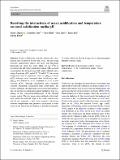Resolving the interactions of ocean acidification and temperature on coral calcification media pH
Abstract
Ocean acidification typically reduces the calcification rates of massive Porites spp. corals but increasing seawater temperatures (below the stress and bleaching threshold) can offset this effect. Here we use δ11B to reconstruct the pH of the calcification media (pHECM) used to precipitate the skeleton in poritid corals cultured over a range of seawater pCO2 and at 25°C and 28°C. Increasing temperature had no significant effect on pHECM at high pCO2 although corals increased their calcification rates. pHECM was reduced at 28°C compared to 25°C at low seawater pCO2, although calcification rates remained constant. Increasing calcification rates could reflect the positive influence of temperature on aragonite precipitation rate, an increase in calcification media saturation state or a change in the concentration/behaviour of the skeletal organic matrix. The 2 temperatures utilized in this study were within the seasonal range at the coral collection site and do not represent a heat stress scenario. Increasing seawater temperatures may promote calcification in some corals in the future but are unlikely to benefit the majority of corals, which are already living close to their maximum thermal tolerance limits.
Citation
Allison , N , Cole , C , Hintz , C , Hintz , K , Rae , J & Finch , A 2021 , ' Resolving the interactions of ocean acidification and temperature on coral calcification media pH ' , Coral Reefs , vol. First Online . https://doi.org/10.1007/s00338-021-02170-2
Publication
Coral Reefs
Status
Peer reviewed
ISSN
0722-4028Type
Journal article
Description
This work was supported by the UK Natural Environment Research Council (award NE/I022973/1) to AAF and NA.Collections
Items in the St Andrews Research Repository are protected by copyright, with all rights reserved, unless otherwise indicated.

